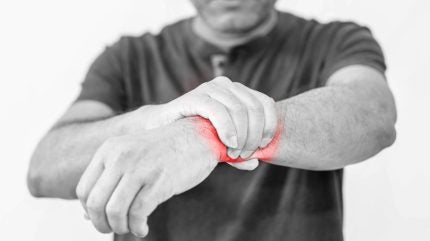
Swedish biotechnology firm Hansa Biopharma has announced that its investigational drug imlifidase improved motor function in patients with Guillain-Barré Syndrome (GBS) in a Phase II study.
The Lund-based company has said that patients on the 15-HMedIdeS-09 single-arm trial (NCT03943589) saw a fast return to independently walking, and a median time to independently walk of 16 days after a single dose of imlifidase twinned with immunoglobulin (IVIg).

Discover B2B Marketing That Performs
Combine business intelligence and editorial excellence to reach engaged professionals across 36 leading media platforms.
The indirect treatment comparison concluded that patients in the 15-HMedIdeS-09 study treated with imlifidase as well as IVIg returned to independently walking six weeks sooner than those in the International Guillain-Barré Syndrome Outcome Study (IGOS), a real-world comparator group who were only treated with IVIg.
Hitto Kaufmann, chief research and development officer at Hansa Biopharma, said: “Our Phase II study results and the indirect treatment comparison with IGOS are critically important. Together they demonstrate the significant role imlifidase may play in future treatment options for GBS patients.
“Unlike other molecules, imlifidase can effectively and very rapidly remove immunoglobulin G through enzymatic cleavage – halting the progression of nerve damage associated with GBS and stopping disease progression. The main goal of improved GBS treatments is to stop nerve damage early, reduce the time of hospitalisation and support patients in regaining independence sooner.
“These findings underscore the role pathogenic IgG plays in severity and progression of GBS, and the clear potential of imlifidase to address unmet need in immunoglobulin G-driven autoimmune diseases where faster-acting treatment options are needed.”

US Tariffs are shifting - will you react or anticipate?
Don’t let policy changes catch you off guard. Stay proactive with real-time data and expert analysis.
By GlobalDataGBS is an immune disorder, typically characterised by the nervous system attacking a patient’s own peripheral nervous system—the network of nerves that carries signals from the brain and spinal cord to the rest of the body. As a result, patients often experience a degeneration in basic motor functions as the syndrome progresses. Typically the disease is caused by the antibody immunoglobulin G.
The 15-HMedIdeS-09 study included 30 adult patients during which three patients were re-diagnosed, and the remaining 27 patients received a confirmatory diagnosis of severe GBS. After the first week, 37% of patients were able to independently walk and the mean improvement in muscle strength was 10.7 points as assessed by the Medical Research Council (MRC) sum score. When compared with results from the IGOS real-world comparator group, patients treated with a combination of imlifidase and IVIg saw what the company describes as significantly faster improvements in disability.
Now the company says it has held a conference call with stakeholders to announce the success as it considers its next moves. Meanwhile, the company has also announced the completion of recruitment and randomisation for its pivotal Phase III ConfIdeS trial of imlifidase in kidney transplantation.





